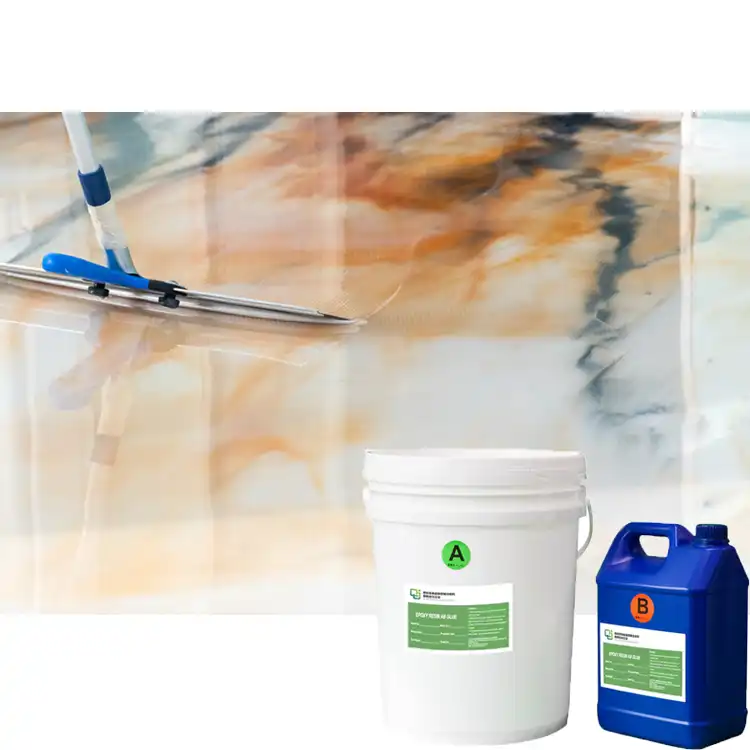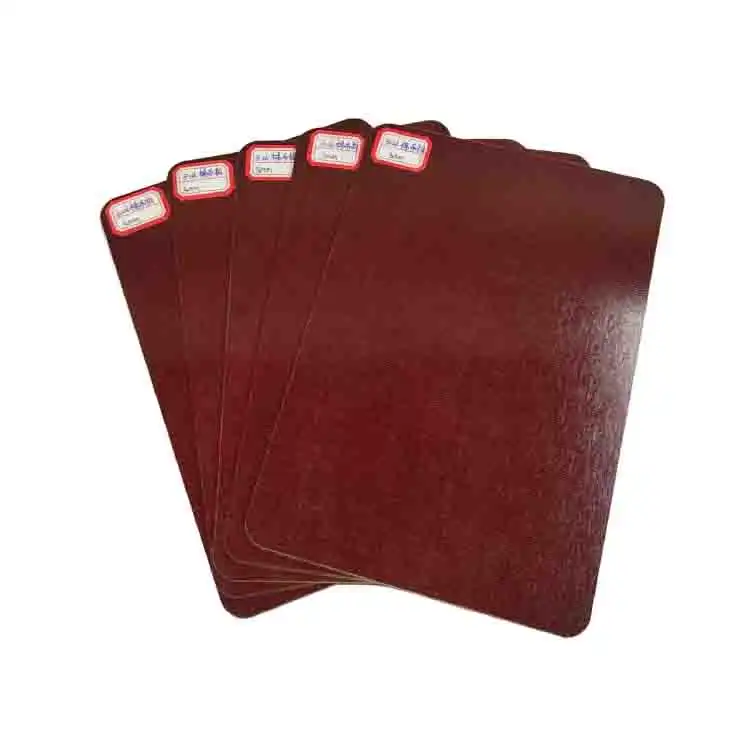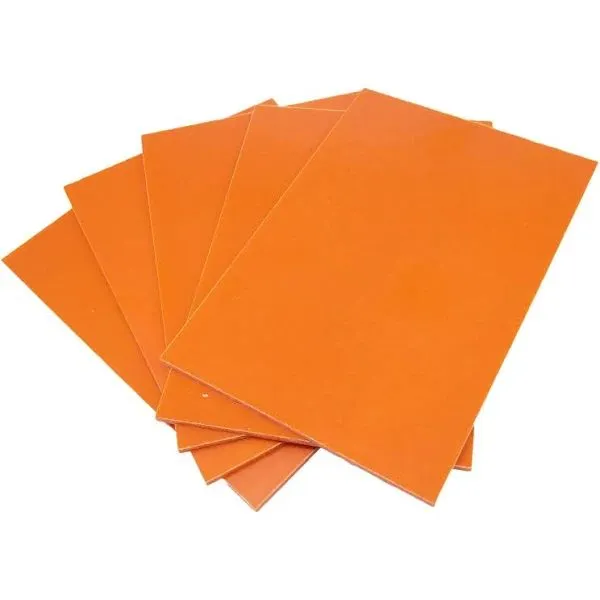What Is the Strength of Bakelite Sheet?
2024-07-25 13:55:02
Because of their exceptional strength and adaptability, bakelite sheets have been a mainstay of materials research since their creation. Because of their remarkable mechanical qualities, which include their capacity to tolerate high levels of stress and strain, these sheets are extensively utilized in many different sectors. This blog will examine the durability of Bakelite sheets, describing their features, uses, and the factors that make them still important in contemporary manufacturing and engineering.
|
|
Basic Information: Brand: JingHong Materials: Phenolic Resin Nature Color: Black and Orange Thickness: 2mm --- 100mm Regular Size: 1040mm*2080mm Custom Size: 1220mm*2440mm Packaging: Regular packing, Protect by Pallet |
| Learn More | |
How Strong Is Bakelite Compared to Other Materials?
Bakelite, a phenolic resin, is preferred in applications where durability and resistance to mechanical stress are essential due to its high mechanical strength. Examining Bakelite sheets' mechanical properties in relation to those of other materials that are commonly used is one way to determine their comparative strength.
Tensile and flexural strength are important indicators of a material's ability to resist deformation and failure under stress. Bakelite sheets have a lot of tensile and flexural strength.
Tensile Strength Bakelite typically has a tensile strength between 70 and 110 MPa. The maximum amount of tensile stress a material can withstand before breaking is measured by this property. Bakelite is a strong option for applications requiring high tensile strength when compared to other materials like PVC (30-50 MPa) and even some metals.
Bakelite also has a high flexural strength, usually between 100 and 150 MPa. The material's capacity to resist deformation under load is known as its flexural strength, which is crucial for structural applications. Bakelite is suitable for components that must withstand bending and flexing without breaking because of its strength.
Bakelite's compressive strength is another important property that demonstrates its capacity to withstand loads that tend to reduce its size. Bakelite outperforms many polymers and is comparable to some metals in its capacity to handle compressive loads. Its compressive strength typically exceeds 200 MPa.
Compare Bakelite to Other Materials Bakelite stands out from other materials because it has a good balance of tensile, flexural, and compressive strengths:
- PVC: Lower compressive and tensile strengths (60-80 MPa) (30-50 MPa).
- Polycarbonate (PC): Lower compressive strength (100-150 MPa) but a higher tensile strength (70-80 MPa).
- Metals made of aluminum: Higher compressive and tensile strengths (250-400 MPa), but Bakelite's unique advantages include its resistance to corrosion and non-conductive nature.
Impact Resistant Despite the fact that Bakelite is well-known for its high strength, it must be noted that it is less resistant to impact than other plastics. In exchange for its superior heat and chemical resistance, which are essential in many applications, this material has brittleness.

What Are the Key Applications of Bakelite Sheets?
Bakelite sheets are utilized in a variety of applications due to their high strength, long lifespan, and resistance to heat and chemicals. They can be used in both consumer and industrial goods due to these properties.
Electrical Insulation Electrical insulation is one of Bakelite sheets' primary uses, where their properties offer significant advantages.
Due to their excellent electrical insulation and mechanical strength, bakelite sheets are frequently utilized in electrical panels and switchboards. They protect against electrical faults and provide a stable foundation for a variety of electrical components.
On circuit boards, bakelite serves as an insulating layer, supporting electronic components and guaranteeing their safe and stable operation. Due to its ability to withstand high temperatures without deterioration, it is ideal for use in electronic devices.
Industrial Components Because of their reliable mechanical properties, bakelite sheets are an essential component in numerous industrial applications.
Bearings and Bushings Bakelite's compressive strength makes it a good choice for bearings and bushings, which need to withstand a lot of stress and load without breaking. Machinery can run for a long time thanks to its low friction coefficient and wear resistance.
Gears and Pulleys Bakelite is used in gears and pulleys due to its mechanical strength and durability, ensuring reliable operation even in harsh environments. Its resistance to synthetic compounds and intensity further enhance its suitability for contemporary applications.
Bakelite sheets have a long history of being utilized to make buyer merchandise since they consolidate strength, sturdiness, and stylish allure.
Kitchenware and Appliances Due to its high mechanical strength and heat resistance, bakelite is frequently utilized in kitchenware and appliances. Bakelite's properties ensure that cookware handles and parts for electrical appliances will last for a long time.
Bakelite is a popular material for decorative items due to its versatility in terms of shape and finish. These things will continuously look and capability the equivalent due to their strength and protection from the components.
Automotive and Aerospace The automotive and aerospace industries use Bakelite sheets to make a variety of components that need to be extremely strong and long-lasting.
Components for the Interior Due to its strength and resistance to heat and chemicals, bakelite is utilized for interior components like dashboards and trim panels.
Electrical Systems The insulating properties of bakelite protect wiring and other components in electrical systems used in aerospace and automotive applications from thermal damage and electrical faults.

Why does Bakelite still play a role in technology today?
Despite the development of newer materials, Bakelite's distinctive combination of properties continues to meet the requirements of contemporary applications.
Longevity and Reliability The high level of dependability and long lifespan of bakelite are major reasons for its continued use. Due to its capacity to maintain performance over time, even in difficult conditions, it is a reliable material in a number of different industries.
Low-maintenance bakelite can be maintained and replaced less frequently due to its durability, which results in cost savings and convenience. This dependability is especially useful in electrical and industrial applications where consistent performance is essential.
Flexibility Bakelite can be used for a variety of things, like electrical insulation and consumer goods. Because it can be machined and shaped into a variety of sizes and shapes, it is more adaptable.
Using a wide range of fillers and additives, Bakelite can be customized to meet your needs and provide customized solutions for a wide range of applications. Due to its adaptability, Bakelite continues to be a viable option for today's engineering challenges.
Cost-Effectiveness Bakelite is a cost-effective option with high performance and affordability for many applications. Due to its long lifespan and low upkeep requirements, it is economical.
Efficiency in Production The relatively easy-to-follow and cost-effective manufacturing procedure of bakelite makes it an appealing choice for large-scale production. It will continue to be used in businesses where cost control is very important because of its effectiveness.
Considerations for the Environment When compared to other contemporary synthetic materials, bakelite has a relatively low environmental impact. Its long lifespan and durability reduce waste and the need for frequent replacements.
Sustainability Despite the fact that Bakelite is not biodegradable, its long service life contributes to more environmentally friendly material use. Items made of Bakelite are progressively being reused and reused, raising its natural profile much further.
Recycling and repurposing bakelite products are becoming increasingly popular, reducing waste and promoting sustainability. Because of these efforts, the production and use of bakelite have less of an impact on the environment.
Conclusion
Because of its special blend of high strength, durability, and resistance to heat and chemicals, bakelite sheets continue to be an essential material in many applications. Bakelite's qualities are still in demand in current engineering and production, from consumer items and automobile parts to electrical insulation and industrial components. Its enduring importance in the current material world is guaranteed by its demonstrated performance, adaptability, and affordability.
References
1. The History and Uses of Bakelite. (n.d.). Retrieved from [Science History Institute](https://www.sciencehistory.org/historical-profile/leo-hendrik-baekeland-and-bakelite)
2. Bakelite: The Material That Changed the World. (2023). Retrieved from [American Chemical Society](https://www.acs.org/content/acs/en/education/whatischemistry/landmarks/bakelite.html)
3. Applications of Bakelite Sheets. (2022). Retrieved from [ResearchGate](https://www.researchgate.net/publication/322658616_Applications_of_Bakelite_Sheets)
4. Phenolic Resins in Industrial Applications. (2021). Retrieved from [Construction Specifier](https://www.constructionspecifier.com/phenolic-resins-in-industrial-applications/)
5. The Versatility of Bakelite in Modern Manufacturing. (2020). Retrieved from [Industry Week](https://www.industryweek.com/technology-and-iiot/the-versatility-of-bakelite-in-modern-manufacturing)








